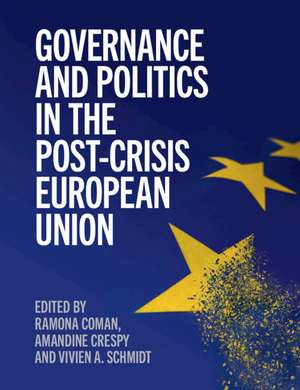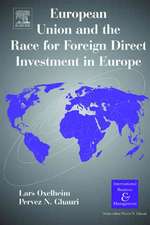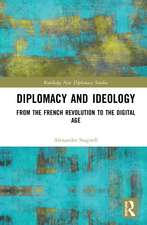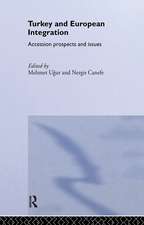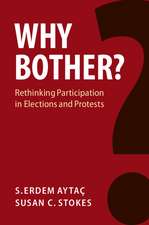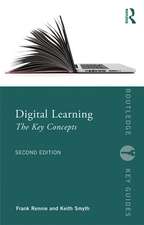Governance and Politics in the Post-Crisis European Union
Editat de Ramona Coman, Amandine Crespy, Vivien A. Schmidten Limba Engleză Paperback – 26 aug 2020
| Toate formatele și edițiile | Preț | Express |
|---|---|---|
| Paperback (1) | 327.86 lei 6-8 săpt. | |
| Cambridge University Press – 26 aug 2020 | 327.86 lei 6-8 săpt. | |
| Hardback (1) | 693.30 lei 6-8 săpt. | |
| Cambridge University Press – 26 aug 2020 | 693.30 lei 6-8 săpt. |
Preț: 327.86 lei
Nou
Puncte Express: 492
Preț estimativ în valută:
62.74€ • 67.09$ • 52.31£
62.74€ • 67.09$ • 52.31£
Carte tipărită la comandă
Livrare economică 17 aprilie-01 mai
Preluare comenzi: 021 569.72.76
Specificații
ISBN-13: 9781108711777
ISBN-10: 1108711774
Pagini: 444
Ilustrații: 13 b/w illus. 1 map 12 tables
Dimensiuni: 189 x 245 x 20 mm
Greutate: 0.95 kg
Editura: Cambridge University Press
Colecția Cambridge University Press
Locul publicării:Cambridge, United Kingdom
ISBN-10: 1108711774
Pagini: 444
Ilustrații: 13 b/w illus. 1 map 12 tables
Dimensiuni: 189 x 245 x 20 mm
Greutate: 0.95 kg
Editura: Cambridge University Press
Colecția Cambridge University Press
Locul publicării:Cambridge, United Kingdom
Cuprins
Foreword; Chronology; Glossary; Abbreviations; 1. The European Union as a political regime, a set of policies and a community after the crisis: an overview Ramona Coman, Amandine Crespy and Vivien Schmidt; Part I. The EU's political regime: 2. European regional integration from the 20th to the 21st century Kiran Klaus Patel; 3. Institutions and decision-making in the European Union Sergio Fabbrini; 4. Regulatory networks and policy communities Jacob Hasselbalch and Eleni Tsingou; 5. Old and new concepts of EU governance: intergovernmentalism, supranationalism, and parliamentarism Vivien A. Schmidt; Part II. Key policy areas in flux: 6. Cohesion and the EU budget: is conditionality undermining solidarity? John Bachtler and Carlos Mendez; 7. Agriculture and environment: greening or greenwashing? Gerry Alons; 8. The internal market: increasingly differentiated? Michelle Egan; 9. The European Monetary Union: how did the Euro area get a lender of last resort? Cornel Ban; 10. Social policy: is the EU doing enough to tackle inequalities? Amandine Crespy; 11: Labour markets and mobility: how to reconcile competitiveness and social justice László Andor; 12: Managing the refugee crisis: a divided and restrictive Europe? Sarah Wolff; 13: Security in the Schengen Area: limiting rights and freedoms? Julien Jeandesboz; 14: Trade policy: which gains for which losses? Ferdi De Ville; 15. Global tax governance: is the EU promoting tax justice? Rasmus Corlin Christensen and Len Seabrooke; 16. The common security and defence policy in transition: towards 'strategic autonomy'? Jolyon Howorth; Part III: Existential debates: 17. North and south, east and west: is it possible to bridge the gap? Kristin Makszin, Gergő Medve-Bálint and Dorothee Bohle; 18. Democracy and the rule of law: how can the EU uphold its common values? Ramona Coman; 19. Democracy and disintegration: does the state of democracy in the EU put the integrity of the Union at risk? Joseph Lacey and Kalypso Nicolaïdis; Appendices; Index.
Recenzii
'In this textbook, leading EU scholars provide a comprehensive account of how EU institutions and policies have changed during and after the multiple crises the EU has been facing since 2008.' Prof. Dr Tanja A. Börzel, Chair for European Integration at the Otto-Suhr-Institute for Political Science, Freie Universität Berlin
'A textbook for the troubled times in which we live, placing those troubles at the very heart of the analysis. Exciting, innovative, timely and, above all, honest in its analysis, this is the new key reference for all students of European integration and disintegration.' Colin Hay, Professor of Political Sciences in the Centre for European Studies and Comparative Politics, Sciences Po, Paris
'This exciting new book studies the European Union by incorporating the many challenges that it is facing, in a host of policy-making areas, whether they be the Brexit, politicization of European integration, or the legacies of the migration and financial crises. It also examines the ongoing issues ahead: differentiation, social inequalities and what the EU can do to improve global governance. This much-awaited book provides a novel take on European integration in the current challenging times and is bound to become a very important must-read book for students, researchers and practitioners.' Amy Verdun, Professor of Political Science, University of Victoria
'A textbook for the troubled times in which we live, placing those troubles at the very heart of the analysis. Exciting, innovative, timely and, above all, honest in its analysis, this is the new key reference for all students of European integration and disintegration.' Colin Hay, Professor of Political Sciences in the Centre for European Studies and Comparative Politics, Sciences Po, Paris
'This exciting new book studies the European Union by incorporating the many challenges that it is facing, in a host of policy-making areas, whether they be the Brexit, politicization of European integration, or the legacies of the migration and financial crises. It also examines the ongoing issues ahead: differentiation, social inequalities and what the EU can do to improve global governance. This much-awaited book provides a novel take on European integration in the current challenging times and is bound to become a very important must-read book for students, researchers and practitioners.' Amy Verdun, Professor of Political Science, University of Victoria
Descriere
An original new textbook providing an up-to-date, critical perspective of how the EU works, and what issues it faces, in the post-crisis era.
